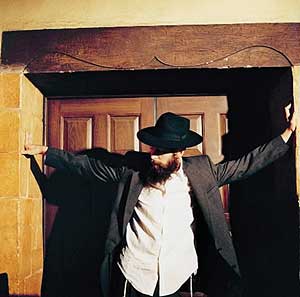Matisyahu review
Matisyahu review
Andrew DreverJuly 14, 2006
 You'd think he'd be used to it by now, but US Hasidic reggae star Matisyahu was taken aback by the reaction in Portugal recently.
You'd think he'd be used to it by now, but US Hasidic reggae star Matisyahu was taken aback by the reaction in Portugal recently.Although afforded a near-messianic reception by fans at his shows, a 6' 5" Jewish singer-rapper in traditional Hasidic garb of black suit, white shirt, long beard and black hat - the same uniform he wears on stage each night - is still something of a novelty in Lisbon.
"We had a tremendous turnout at our concert for our first time there," he says, while between concerts in London, "but when I walked down the street, I got two reactions. People either recognised me, because there's no one else in Portugal who looks anything like me, or they think an alien just walked off the spaceship and is walking down the street. They kind of got freaked out. When I'm in Europe, England, Spain or Portugal, it's so in-your-face! You really begin to realise why Jews started cutting their beards and not wearing their yarmulkes. You stand out, and you know what it feels like to be a minority, because you get people looking at you and feeling that you're strange."
Described by Rolling Stone magazine as "the strangest thing to climb the Billboard charts this year", Matisyahu cuts a striking figure, and his unusual look has piqued the curiosity of many music fans.
His breakthrough live album Live at Stubb's has sold 500,000 copies and went top 40 on the album charts in the US, and his latest, Youth, went to number four. His relentless gigging and impassioned, uplifting shows have converted a secular audience to his unique Hasidic reggae sound.
Still dismissed by detractors as a novelty act despite being America's biggest reggae star, Matisyahu is cautious about revealing his theories on his success.
"Some people would say that this is oversimplifying it," he says, "but I think the bottom line is that my music speaks to people. Music touches people, hopefully, and that's why there's a response."
An orthodox Jew doing reggae music is unusual, and reggae purists aren't yet convinced by him, but Matisyahu is unconcerned with appeasing that audience.
"I think that my music is different from the typical reggae sound or even the typical dancehall sound you hear coming up right now," he says. "It's a lot different, and we'll continue to make music that's not reggae music necessarily, because we're constantly listening to different styles of music and we don't feel like we owe it to reggae music to have to stay within the lines of what's considered reggae."
Born into a secular Jewish household in West Chester, Pennsylvania, and raised in White Plains, New York, a camping trip to Colorado and subsequent trip to Israel when he was 16 awakened the then Matthew Miller's dormant Jewish identity.
After he dropped out of school and followed US stoner rock group Phish on a US tour, his worried parents sent him to a wilderness school in Oregon that encouraged artistic pursuits. He attended a weekly open-mic session at a coffee shop, where he rapped, sang and beat-boxed.
He continued honing his skills upon his return to New York in the late '90s, finally converting and adopting the observant name Matisyahu (Hebrew for Matthew).
Now with a wife, Tali and baby son, Laivy, he keeps kosher, prays three times a day and observes the traditional Jewish Sabbath from Friday sunset until Saturday sundown, during which time he can't play gigs. He also cannot come into physical contact with women, which has forced him to do away with his famed stage-diving. Arguably, he is still fighting for credibility, but there is a huge interest in his music.
He comes across as a private, serious and somewhat humourless person, although one senses he has been burned by the press before. He was particularly cagey about discussing messages in his lyrics and is reticent about aligning himself with the Lubavitch stream of Judaism, an association he has freely discussed in the past.
"I don't want to be tied to a movement or be the poster boy for anything," he says. "I don't come with a prescribed plan, like I'm going to convert the world to Judaism or something. But I am going to try and influence every Jew that they should come back to religion!
I just try and make music that's ethical and allows people to find their own answers. I think that's the important thing. People have the answers, and they have to come to it themselves, make decisions and be able to come to a place in themselves, and music is one of those tools that can provide that".
Labels: Matisyahu review
0 Comments:
Post a Comment
<< Home